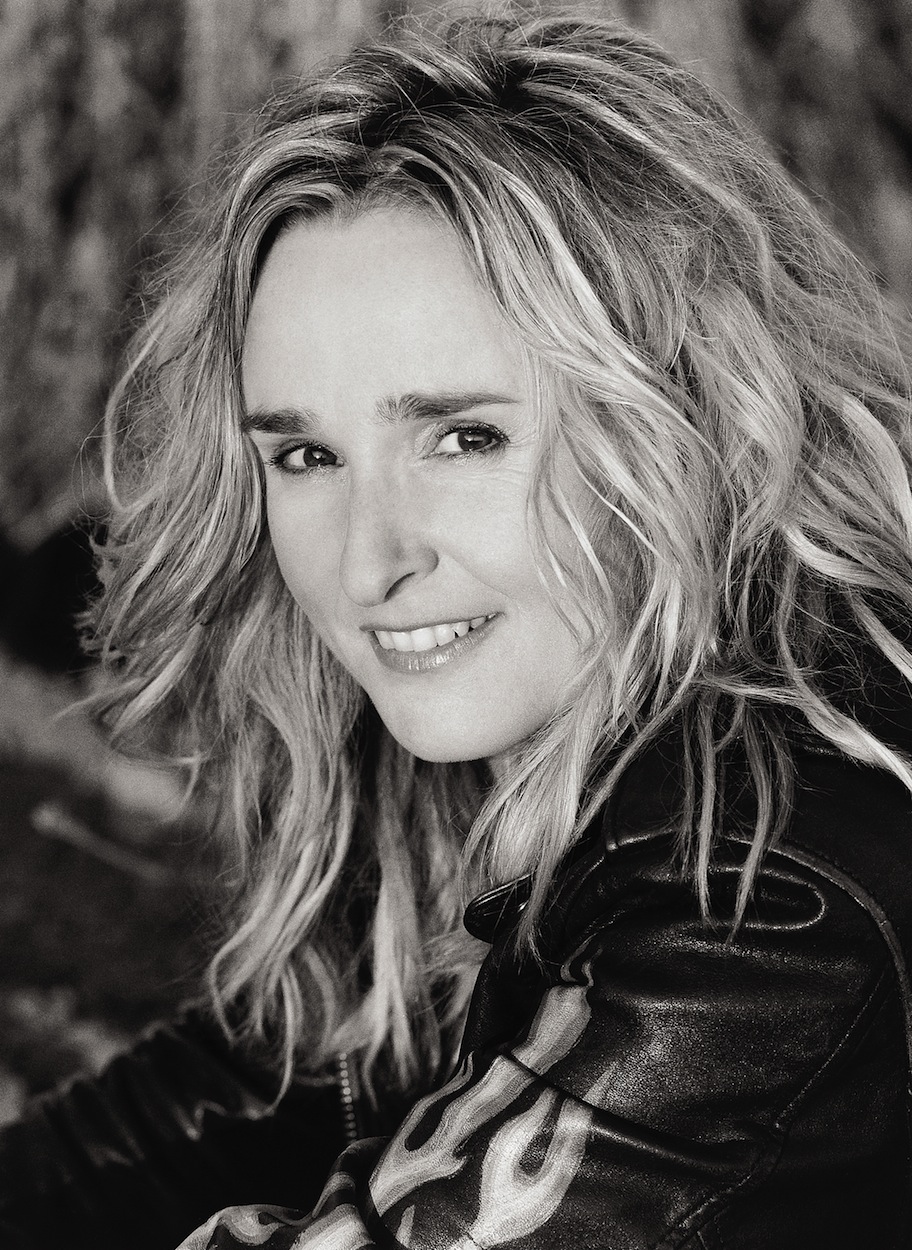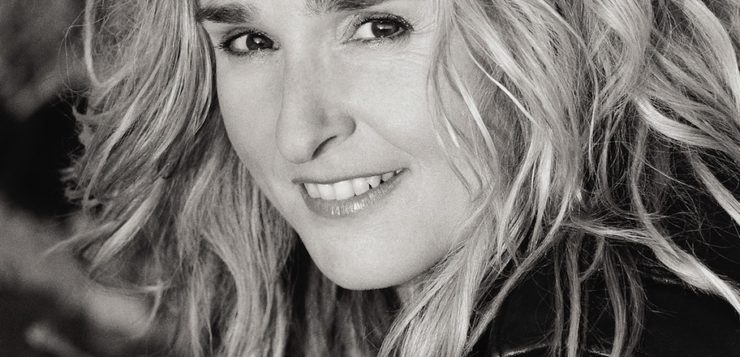Melissa Etheridge has been a lesbian rock icon since 1988, when audiences who had not heard her at clubs and women’s music festivals grabbed her debut album on Island Records. Defying the odds by succeeding in the mainstream as a woman rocker whose work won coverage on VH1 and MTV, as well as in lesbian publications and Rolling Stone, Melissa came out publicly at Bill Clinton’s inauguration in January 1993, and then performed at the March on Washington for gay and lesbian rights later that spring, wrapping up the year with the fall 1993 release of an album defiantly entitled Yes, I Am. Any possible backlash or fallout from that openness would be hard to find: in her fifteen-year career, Melissa has sold approximately 25 million albums worldwide, as well as winning two Grammy awards and twelve nominations.
 During her very public partnership with Julie Cypher, Melissa continued to make headlines by becoming a co-parent to their children Beckett and Bailey—whose father and sperm donor was revealed to be legendary rocker David Crosby in a sensational Rolling Stone cover story. The romantic breakup that followed, emotionally and musically chronicled in Melissa’s albums Breakdown and Skin, was detailed in her 2001 autobiography The Truth Is…, which is frank in its discussion of abusive family and love relationships. The tide turned for Melissa two years ago with a new love, Tammy Lynn Michaels. The couple’s recent wedding made the cover of The Advocate. As a model of the new alternative lesbian family in America—the children alternately live with mom Julie and with Melissa and Tammy, and donor/dad David Crosby is nearby—Melissa has the rare opportunity of speaking, through music and as a headliner at political rallies, as a lesbian mom, partner, and successful middle-aging rock icon.
During her very public partnership with Julie Cypher, Melissa continued to make headlines by becoming a co-parent to their children Beckett and Bailey—whose father and sperm donor was revealed to be legendary rocker David Crosby in a sensational Rolling Stone cover story. The romantic breakup that followed, emotionally and musically chronicled in Melissa’s albums Breakdown and Skin, was detailed in her 2001 autobiography The Truth Is…, which is frank in its discussion of abusive family and love relationships. The tide turned for Melissa two years ago with a new love, Tammy Lynn Michaels. The couple’s recent wedding made the cover of The Advocate. As a model of the new alternative lesbian family in America—the children alternately live with mom Julie and with Melissa and Tammy, and donor/dad David Crosby is nearby—Melissa has the rare opportunity of speaking, through music and as a headliner at political rallies, as a lesbian mom, partner, and successful middle-aging rock icon.
That everything in her life has finally come together in emotional and professional harmony fuels the exuberant format of her new album, Lucky, as well as her “Superclub” tour to promote the CD, which will take Melissa to venues such as L.A.’s House of Blues and the Fillmore in San Francisco, as well as Roseland in New York. Significantly, the otherwise celebratory album contains a post-9/11 ballad, “Tuesday Morning,” challenging U.S. government homophobia in not crediting gay victim Mark Bingham’s heroism—or compensating his surviving partner. After Melissa’s publicist approached The G&LR about an artist profile interview, it was my honor to talk to her by phone. Rest assured, her speaking voice is as sultry as the musical cadence a generation of lesbian fans came out to.
Bonnie Morris: This is such a pleasure for me—I wrote a book on lesbian festival culture, and this interview is part of my interest in documenting the women I think are making a real difference, politically, in the movement through their music.
Melissa Etheridge: Cool.
BM: I know we both want to talk about your new album coming out next month. But first, let’s establish that you’re speaking to a different kind of audience today. This interview will appear in an intellectual journal reviewing gay and lesbian culture. How do you see yourself as a shaper of that culture?
ME: I don’t know if I’m so much a shaper as a representative. And a mirror. Our culture is so huge, and permeates so many different corners of the world. I don’t think I could shape it, but it definitely shapes me. And we are all moving ahead.
BM: Let’s look at the new album. How does this one differ in mood and style?
ME: Well, in mood, it’s definitely different. I’d say my last two albums before this were “Here I go to the bottom of the depth; let’s go all the way to the dark side.” And then this album is “Ohhh. I have come out of it, and even better, now I’m on with my journey—I don’t ever have to do that again.” So the mood is definitely different.
BM: It’s almost like a celebration. An upswing.
ME: Yes. Yes. I can’t wait to play it. Because it is a celebration.
BM: I’ve been listening to the advance copy of the album you sent. The main single, “Breathe,” deals with a subject you often address—and that you addressed in your book [The Truth Is…]. It’s about maintaining a relationship while being on the road. Has that grown easier for you, now that things are so great with Tammy?
ME: It’s funny—it’s actually harder. Because in my past relationship, when I was on the road, it was good to be away from each other; there were so many difficult things. Now, with this new person, I really miss her because it is so excellent. It’s no longer a relief to be away. Not only do I miss my love, my partner, but I miss my children, my home—the great place that I’ve built. And it’s very difficult.
BM: Yet I think it’s great that you can present a song so that your audience is aware of those other parts of you—mother, partner. They know you are not somebody who leaves that domestic set-up readily, where others might seize upon touring as an excuse. What about the other songs on the album that address family life and your relationship?
ME: Well, a lot of them represent my relationship. “Mercy”—that one really is the cornerstone of the album—it asks, can I really do this, jump in there, when I’ve really been through a lot? “You say it will be good—let’s see.” There’s a lot of those lyrics, and a lot of just fun, sexy songs. I’m just having fun.
BM: Then you have some really breakthrough political songs. “Tuesday Morning,” which I think is so important, addresses the heroism of Mark Bingham on 9/11, and how his surviving partner was denied government benefits.
ME: Yeah, and that was the hardest one to write, as they usually are, the couple that I’ve written like that. I have to speak truthfully, and present what I’m trying to say in a way that won’t be turned off. When I first started writing it, I was so angry. I wanted to say [to Attorney General John Ashcroft]: “He probably saved your life, you asshole!” But no one’s going to hear me when I’m hollering. They could hear it if they could crawl into it. So I had to really present it like, can you just think about this?
BM: I think it’s harder and harder for gay and lesbian Americans to express our particular patriotism in those terms, and you point out how we must be counted in terms of our life-saving contributions.
ME: That’s exactly it. In a time when our country was wounded, hurt, our community was also wounded and hurt. The same percentage of the world that is gay and lesbian was in that World Trade Center, was in both those buildings, was on those airplanes. It was hard when it began to show that we were not accounted for; it would be a chance to sort of bring together a lot of our community and say, “Yes, we are Americans, and we contributed and we suffered.” And now we are at war! And we are in the services—we are everywhere. It was just ridiculous. It is hard to be a patriot when they try to make us so invisible.
BM: Are you going to be performing that on your tour, with some kind of introduction similar to what you’ve just said to me? You can reach so many people with those lyrics.
ME: I wonder. It’s interesting; my shows are—and especially this one—a celebration, this one’s going to be huge. There will be a moment I’m planning—and I start rehearsal this week—sort of bringing “Scarecrow,” “Tuesday Morning,” and “Legacy,” those three songs, together. I’m going to bring them together and present just a moment in the concert. I don’t know yet; we’ll see.
BM: Do you feel that your recent marriage, and ongoing motherhood, have made you more political than ever? Do you expect to be more involved, politically, in 2004?
ME: Oh, definitely. When you have two children—boy, do I want this world to be much more perfect. It’s really important to me. And I find myself very involved, where I used to be just hanging out and observing. I still think the best thing I can do is just to be a good person and be an example. But you’re gonna hear me, especially next year, on the campaign for Dean—or whatever Democrat wins the nomination!
BM: Do you anticipate playing at his rallies?
ME: Oh, yeah. I’ve already been in contact with Howard Dean. He reached out to me a long time ago. He’s a good guy. He called me about a year ago, and I met with him and he told me his politics. That’s what I love about him: right straightforward. He didn’t try to go, “I’ll do this, and this, and this.” He said “Look, this is where I stand.” Completely open: “I believe in gay civil rights, but I’m not gonna call it marriage.” I was like, “Dude? Give me the rights, I don’t care if you call it fruitcake.” I was impressed—he knows what’s important.
BM: Let me ask about issues that face women in rock these days. We’ve come a long way, but are female artists still held to different standards in the music industry?
ME: We’ve come so far. The music business is in such poor shape. If you can sell, no one cares if you’re a man or a woman. With women, they still lean toward what’s good to look at; you’ll get a lot more exposure if you’re pretty to look at. We’re still fighting against that. But I still believe in the culture, peoples’ need for music and songs to enrich their lives; I still believe that people look for that, whether it’s pretty to look at or not.
BM: Your audiences aren’t that superficial. And you actually have more opportunities now that you’re in your forties. You and I were both born in 1961—
ME: There ya go!
BM: What does it mean to be finding new power and authority as a middle-aging rock star? You have that great line in the new song “Mercy” about reaching age ten, and ten and ten and ten again. Do you see yourself in the middle of this timeline from the first out lesbian artists of the 70’s to the young gay women of today?
ME: Yes. I’m in a very interesting place. The women that came before me—as my good friend Steven Spielberg always says, “the people that laid down on the barbed wire”—for those women who came out in the seventies, it was for the women, for the lesbians, right down the lesbian line. And I was impressed and influenced by them in my younger years, and gathered upon their strength to go into the mainstream. If I’m inspiring any young artist anywhere who is a homosexual, yay!
BM: You really are the most well-known woman to go from performing at mostly lesbian women’s music festivals to success in the mainstream. You made that transition almost in one year, at the end of the 1980’s. For others in the women’s community, making that transition to mainstream success, and what it takes to get mainstream airplay, has been more difficult—it’s often a painful conversation at the festivals. You have to be savvy about promoting yourself and your work outside of the women’s music circle. A lot of women are still considered too radical for the mainstream, and they’re still playing as main attractions at the women’s music festivals. Would you ever consider playing at Michigan [the Michigan Womyn’s Music Festival]?
ME: It’s funny because I never played Michigan. I always felt like a failure on the festival circuit because I was never asked to play there.
BM: God, would they love to have you there now! The festival’s about to turn 29, and a lot of the fans who originally supported your work are in that ongoing audience. It’s kind of a graying culture—how do we attract younger women? But having artists like you who are so well-known, that would help pack ’em in. Just a thought!
ME: I was wondering what the attendance was like now.
BM: About half of what it was at peak—it once reached over 9,000, and now it’s about 4,000. But here’s a fun question. Many women who came out to your music feel that you’ve provided a soundtrack to their coming out years and relationships. That’s a wonderful tribute. But who was your soundtrack? Whose music do you like to have as background for your own romantic moods?
ME: Oh, wow! Oh, my gosh. Well, music is just so much a part of my life. Put on a Joan Armatrading song, boom, I’m somewhere. Put on her song “Heaven,” and I’m in love, and let’s go. Joni Mitchell, Bruce Springsteen, Peter Gabriel—all these great singer-songwriters. Now, though, if I’m like, hey, let’s be in a romantic mood, I’ll go to some chill music, lounge.
BM: Let’s get back to the new album: what are your touring plans?
ME: I start February 17th, here in Los Angeles. We decided the first time around to do what we’re calling a “Superclub” tour: House of Blues, the Fillmore, Roseland in New York City, places that hold about a thousand-plus people, and we’re doing multiple nights. Lots of sweaty rock, letting people know we’re back! That’s the plan for the first three months, and then we’ll probably come back through in a larger venue.
BM: Which audiences excite you most in which cities? Do you have favorite places?
ME: You know what? There are some cities that never let me down. Like Chicago. Always awesome. And New York City’s always fun.
BM: My girlfriend liked the show you did at Jones Beach—said it soothed her soul.
ME: That one was very relaxed.
BM: Do your kids understand the excitement over the new album and tour?
ME: I explain everything to them, tell them everything. They’re smart kids. They know that this is my job, my work, and that most every summer they get to go on tour a little bit—I can’t take them too much, because it wears them out. My daughter, who is just the smartest, sweetest, craziest thing you’ve ever seen, knows that there are times when I’m Mama, and times when I’m “Me-lissa Eth-er-idge!”
BM: Is Tammy going with you on this tour?
ME: Oh, yeah, as much as she can. She also takes care of the kids, but she likes to travel. She’s wonderful; she makes my life amazing.
BM: People seem to be responding very positively to the cover story you and Tammy gave to The Advocate, where you talk about getting married.
ME: I surprised myself.
BM: Do you think there will be more challenges to the Massachusetts ruling on gay marriage?
ME: Oh, yeah. But I’ll keep my tour as a celebration and fuel; I don’t think it’s my job to preach. If someone asks me, like you, I’ll tell you what I think.
For more information on Melissa Etheridge’s tour, visit www.melissaetheridge.com.
Bonnie J. Morris teaches women’s studies at George Washington University.





